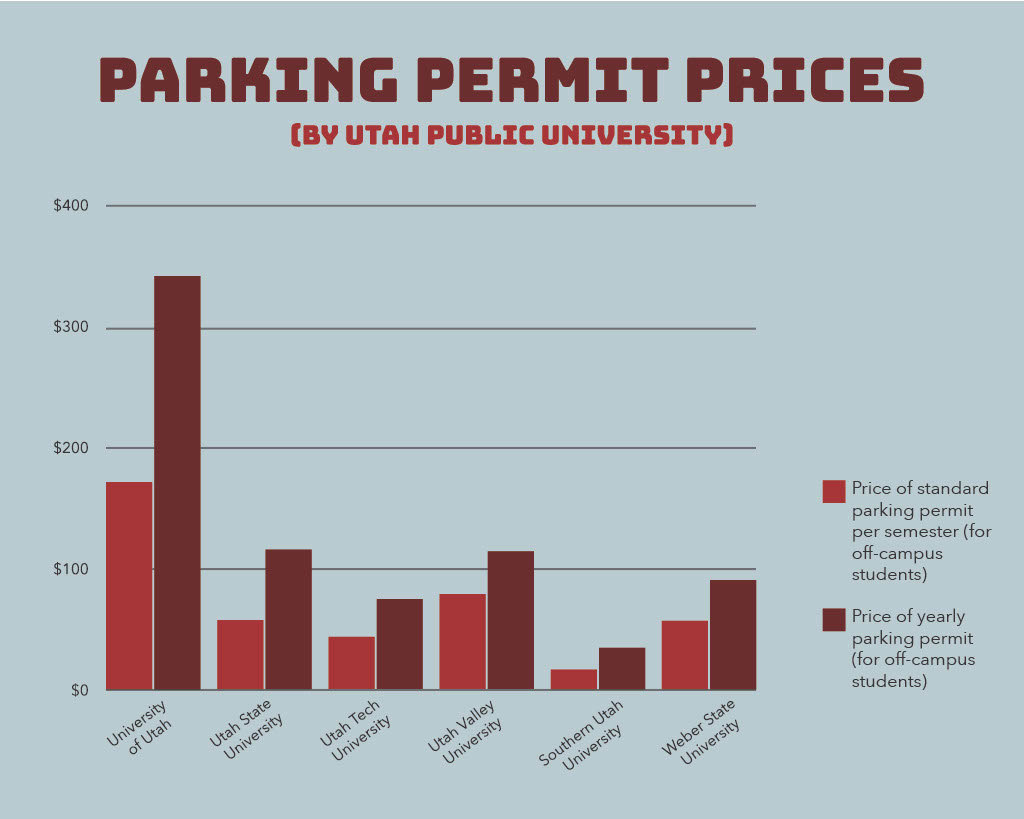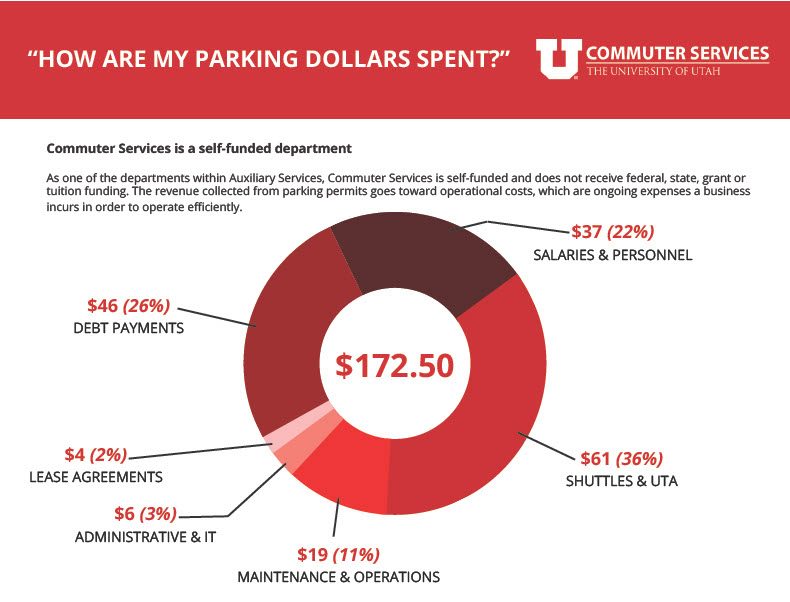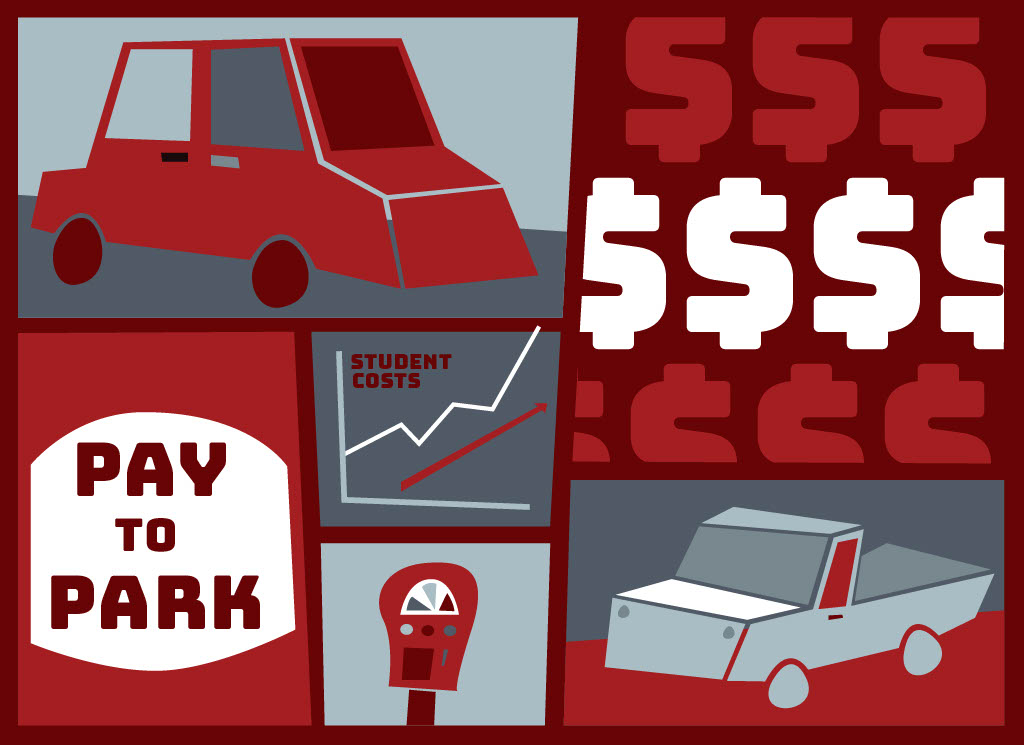For the 2023-24 academic year, the University of Utah raised the prices of parking, making U parking permits for students who live off campus $172.50 per semester — the highest of all Utah’s public universities.
“It seems outrageous to have to pay that much for a parking permit,” said Zachary Plummer, a senior electrical engineering major.
The prices of all parking permits at the U — from the on-campus housing permit ($172.50) to the garage permits ($414) — have been increased by 15%.
Utah Valley University’s yellow parking permit is the second most expensive permit for off-campus students in the Beehive State at $80 per semester or $115 for a year. The U does not offer an annual parking permit, but their spring semester permit lasts through August.

The U permit currently costs about $60 more than it did in the 2015-16 academic year, said Nicole Tatom, interim director for Commuter Services, in an email interview.
Some lots on the U’s campus, such as outside the A. Ray Olpin Student Union, have an option for hourly paid parking, which increased from $2 to $3 this school year.
Where Does the Money Go?
Tatom said the 15% increase is necessary to fund operational costs including building and maintaining parking, paying back debt on parking garages and running the shuttle services on campus.
She added the bump in price is also due to increased demand. Commuter Services hopes the higher prices will lead more people to instead use mass transit to get to the U.

(Courtesy of Commuter Services)
Plummer said he’s curious to know how much Commuter Service’s operational costs have increased in the last year.
“$172 a piece, thousands of students — you’d expect them to be able to make that money back pretty quickly,” Plummer said.
He added the price still seems “way too high,” especially since parking at the U isn’t “the best,” referring to a common struggle students have of not being able to find a parking spot close to their class, or at all, especially at peak times.
Tatom added that based on a Pac-12 comparison review of the Fall 2021 semester, the U’s parking rates at the time were still “substantially less expensive” than most other Pac-12 schools.
‘Too difficult to find any spots’
Tatom said Commuter Services conducts empty stall counts on campus to make sure their parking inventory matches the number of parking permits they sell.
“We know that even at peak times on campus, primarily Tuesday and Thursday mornings, there are still U stalls available in the periphery lots on campus,” she said.
Hilja Schimmel, a second-year biology major, said she regularly struggles to find parking.
“For the price we’re paying, we should be able to find parking and not drive around for 20 minutes,” Schimmel said.
First-year biology major Jeannine Zoch had to buy a housing permit for this semester so she could park outside the Guest House, where she lives, but so far she’s opted to walk to class because it’s too difficult to find any spots.
“It’s not like you’re getting premium spots,” Zoch said. “It’s not like my car is getting protected and cleaned for the price I’m paying — and it hasn’t moved.”
Jillian Pierce, a third-year Earth and environmental science major, prefers to take public transit to get to the U, even though she lives in South Jordan.
“It’s free, I don’t have to focus on driving … [and] it doesn’t take much longer,” Pierce said.
She added that if someone chooses to drive to the U instead of taking public transit, “maybe they should have to pay more.”
“It makes sense to raise the price for parking so [it] discourages people driving,” Pierce said.
U parking permit prices have increased at least every year since the 2015-2016 school year, said Tatom. Commuter Services doesn’t have data that goes farther back than that.
Since 2019, around 1,974 new parking spaces have been installed around campus, according to 2KUTV. But this doesn’t account for the parking spaces that have been removed in recent years to build new housing.
2News Investigates confirmed that there are over 100 less student parking spots available now than there were four years ago.
In the near future, the U plans to work on an app that will “allow students to see open and available parking spots to cut down on the time they spend currently trying to find one.”
Second-year student Jessica Hicks bought a parking permit last year since she lived on campus. This year, she decided against it because her new place is near Trax.
“We’re paying so much to be at the U already, why make students’ lives even more miserable?” Hicks said.





Ean Warren • Sep 12, 2023 at 9:58 pm
This is quite an interesting article with many tidbits of data. I didn’t realize that Shuttles and UTA costs were included in the expenses for Commuter Services. I found it interesting that Tatom said that prices increased because there was increased demand. She said that the 15% increase is necessary to fund operational costs. But she didn’t say that those costs rose 15% as well. I can see an increase in salaries and maintenance, but not debt payments (weren’t those rates locked in when rates were low?) or lease agreements (which tend to be multi-year). How much did those increase? In sum, I would like to know how much those categories increased from last year to justify the 15% increase in parking passes, and the 50% increase in hourly rates. In addition, if “Commuter Services hopes the higher prices will lead to more people to instead use mass transit to get to the U”, I’m wondering what they are doing with the extra money to encourage this. Subsidizing housing or purchase of ebikes, prizes for people riding their bikes, purchasing smaller, electric vehicles for their fleet? There are other ways to incentivize people besides with a stick. I’m wondering under what part of “Services” in “Commuter Services” does this increase fall?
Regan • Sep 11, 2023 at 9:53 am
It is ridiculous that hospital staff are having to pay the same amount and compete with students for parking. Employees should at least get discounted parking– It costs more than I make in a day of work to pay to park for my ICU job.
Richard F Randolph • Sep 11, 2023 at 8:36 am
What do you expect from this administration right now? Is any going to improve the situation? The business structure has been here for years. There were to be 2 more of these structures built. Nothing was done. No funding has been asked for. Now I’m not sure where they would put them. Of the 1,974 parking spaces, how many of them are open to regular students? Now many have been lost to construction. What is the net gain or loss? Why not make available these types of answers to everyone?